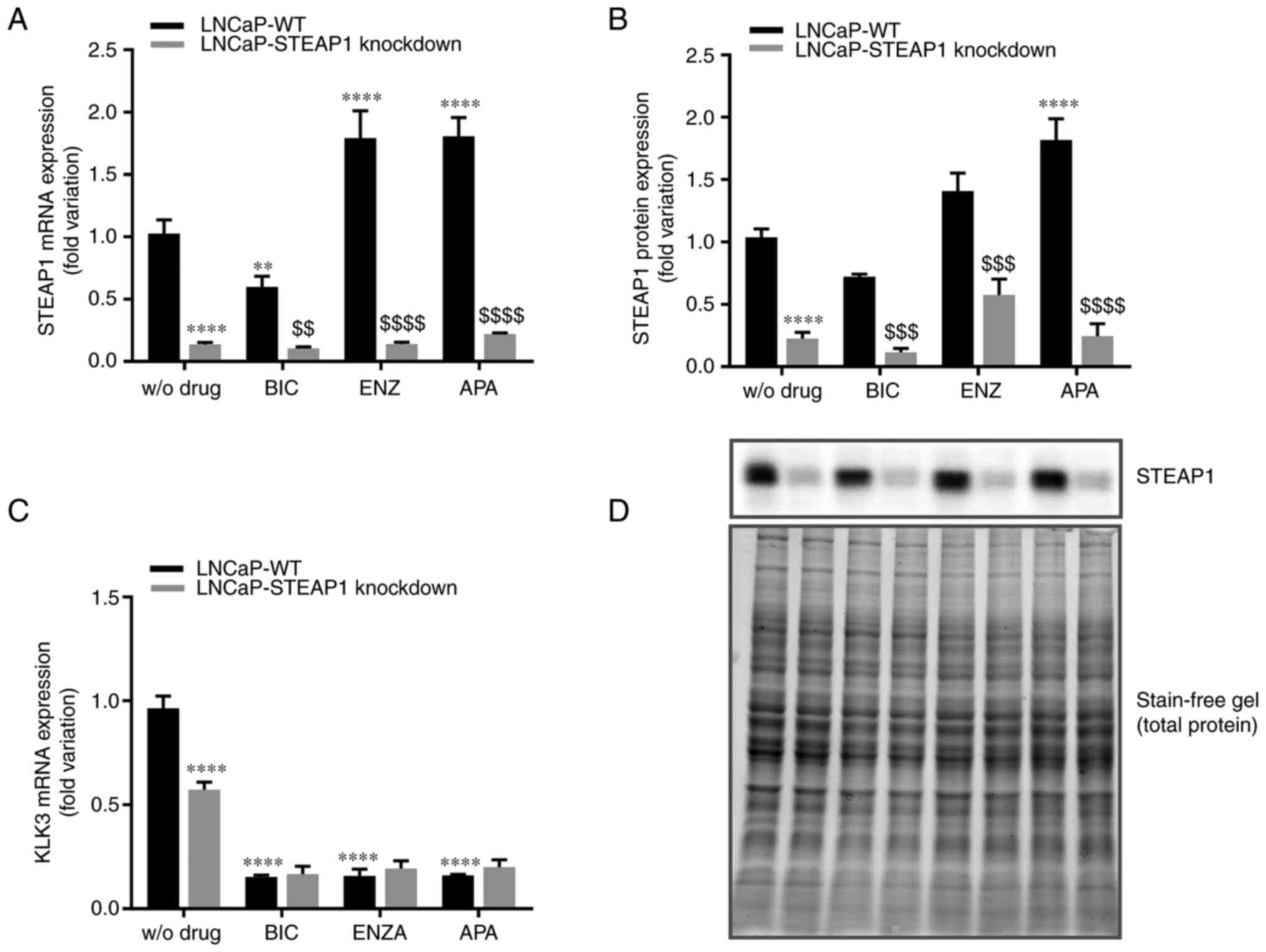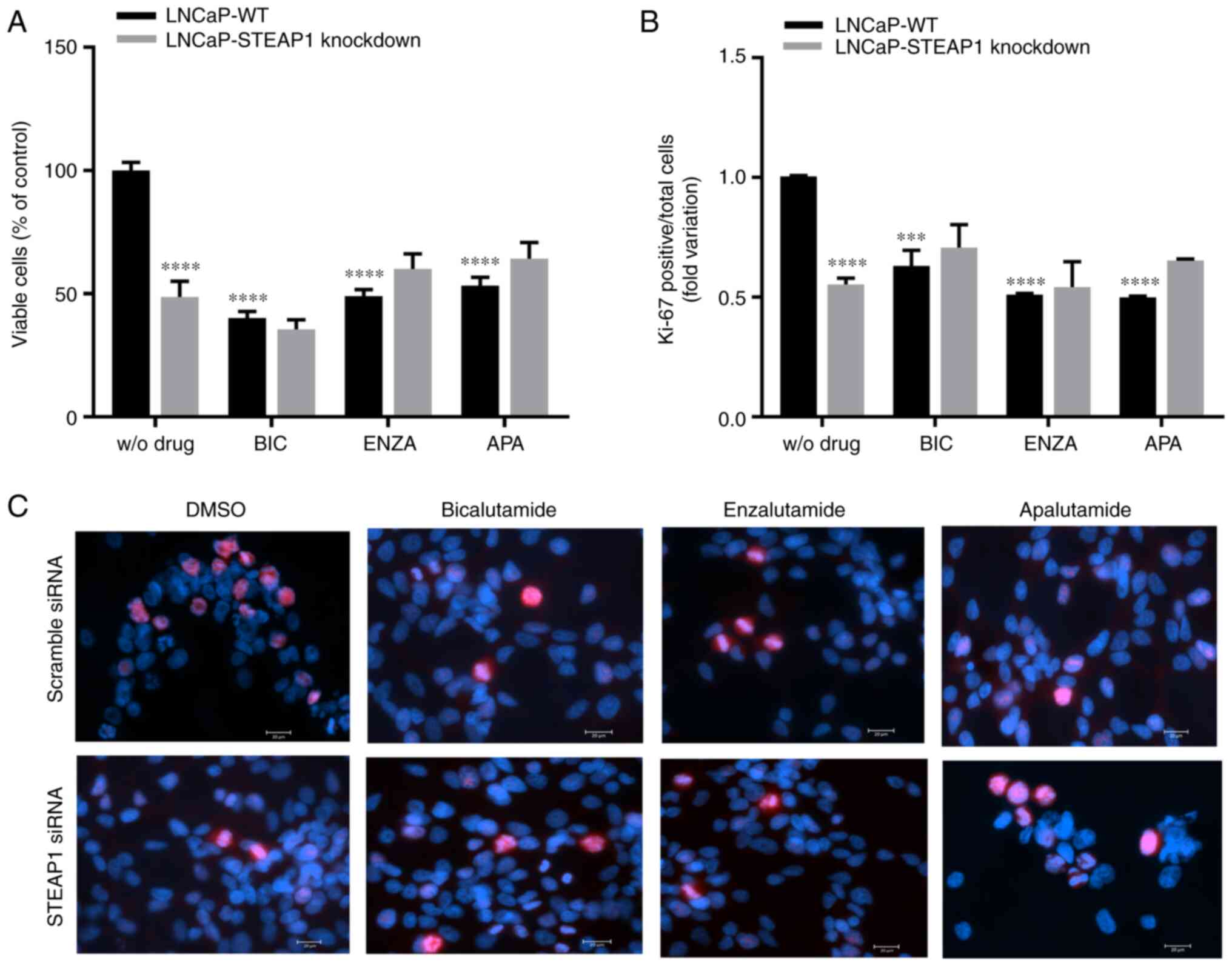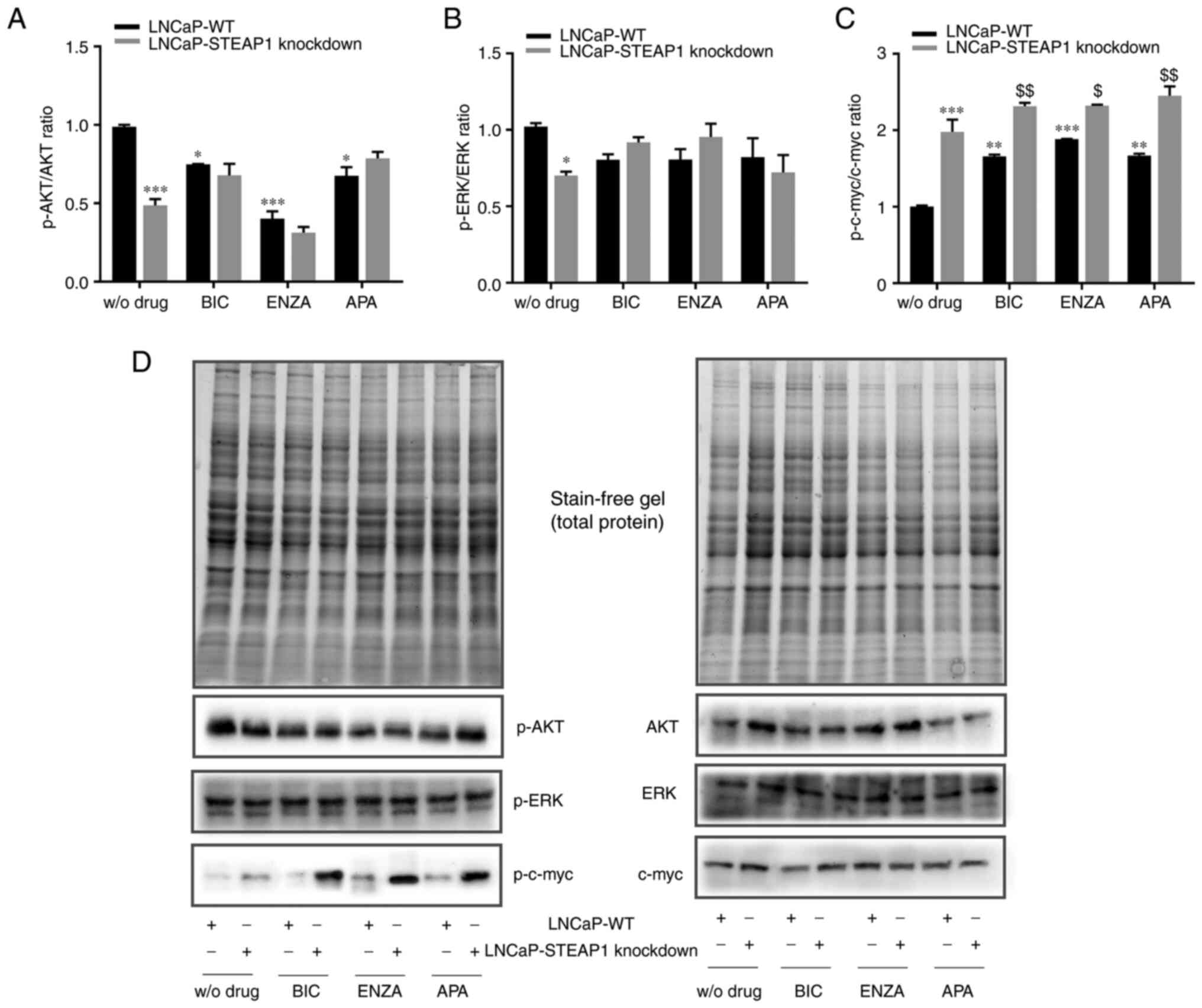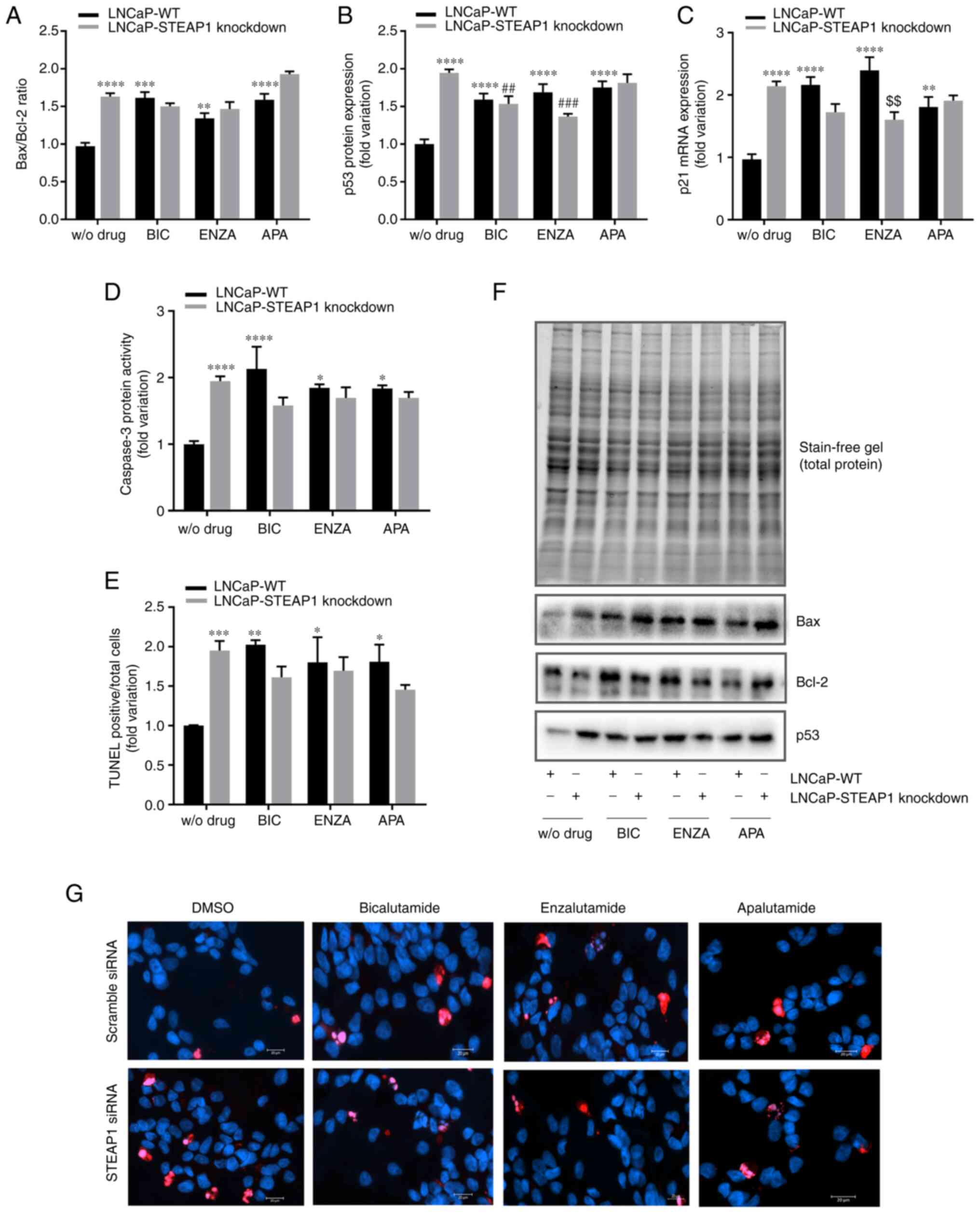|
1
|
Bray F, Ferlay J, Soerjomataram I, Siegel
RL, Torre LA and Jemal A: Global cancer statistics 2018: GLOBOCAN
estimates of incidence and mortality worldwide for 36 cancers in
185 countries. CA Cancer J Clin. 68:394–424. 2018. View Article : Google Scholar : PubMed/NCBI
|
|
2
|
Rawla P: Epidemiology of prostate cancer.
World J Oncol. 10:63–89. 2019. View Article : Google Scholar : PubMed/NCBI
|
|
3
|
Siegel RL, Miller KD, Fuchs HE and Jemal
A: Cancer statistics, 2022. CA Cancer J Clin. 72:7–33. 2022.
View Article : Google Scholar : PubMed/NCBI
|
|
4
|
Shafi AA, Yen AE and Weigel NL: Androgen
receptors in hormone-dependent and castration-resistant prostate
cancer. Pharmacol Ther. 140:223–238. 2013. View Article : Google Scholar : PubMed/NCBI
|
|
5
|
Crawford ED, Schellhammer PF, McLeod DG,
Moul JW, Higano CS, Shore N, Denis L, Iversen P, Eisenberger MA and
Labrie F: Androgen receptor targeted treatments of prostate cancer:
35 years of progress with antiandrogens. J Urol. 200:956–966. 2018.
View Article : Google Scholar : PubMed/NCBI
|
|
6
|
Murray TBJ: The pathogenesis of prostate
cancer. Prostate Cancer [Internet]. Bott SRJ and Ng KL: Exon
Publications; Brisbane, AU: pp. 29–42. 2021, View Article : Google Scholar
|
|
7
|
Teo MY, Rathkopf DE and Kantoff P:
Treatment of advanced prostate cancer. Annu Rev Med. 70:479–499.
2019. View Article : Google Scholar : PubMed/NCBI
|
|
8
|
Hubert RS, Vivanco I, Chen E, Rastegar S,
Leong K, Mitchell SC, Madraswala R, Zhou Y, Kuo J, Raitano AB, et
al: STEAP: A prostate-specific cell-surface antigen highly
expressed in human prostate tumors. Proc Natl Acad Sci USA.
96:14523–14528. 1999. View Article : Google Scholar : PubMed/NCBI
|
|
9
|
Rocha SM, Sousa I, Gomes IM, Arinto P,
Costa-Pinheiro P, Coutinho E, Santos CR, Jerónimo C, Lemos MC,
Passarinha LA, et al: Promoter demethylation upregulates STEAP1
gene expression in human prostate cancer: In vitro and in silico
analysis. Life (Basel). 11:12512021.PubMed/NCBI
|
|
10
|
Maitland NJ, Frame FM, Polson ES, Lewis JL
and Collins AT: Prostate cancer stem cells: Do they have a basal or
luminal phenotype? Horm Cancer. 2:47–61. 2011. View Article : Google Scholar : PubMed/NCBI
|
|
11
|
Chen WJ, Wu HT, Li CL, Lin YK, Fang ZX,
Lin WT and Liu J: Regulatory roles of six-transmembrane epithelial
antigen of the prostate family members in the occurrence and
development of malignant tumors. Front Cell Dev Biol. 9:7524262021.
View Article : Google Scholar : PubMed/NCBI
|
|
12
|
Barroca-Ferreira J, Pais JP, Santos MM,
Goncalves AM, Gomes IM, Sousa I, Rocha SM, Passarinha LA and Maia
CJ: Targeting STEAP1 protein in human cancer: Current trends and
future challenges. Curr Cancer Drug Targets. 18:222–230. 2018.
View Article : Google Scholar : PubMed/NCBI
|
|
13
|
Rocha SM, Socorro S, Passarinha LA and
Maia CJ: Comprehensive landscape of STEAP family members expression
in human cancers: Unraveling the potential usefulness in clinical
practice using integrated bioinformatics analysis. Data. 7:642022.
View Article : Google Scholar
|
|
14
|
Challita-Eid PM, Morrison K, Etessami S,
An Z, Morrison KJ, Perez-Villar JJ, Raitano AB, Jia XC, Gudas JM,
Kanner SB and Jakobovits A: Monoclonal antibodies to
six-transmembrane epithelial antigen of the prostate-1 inhibit
intercellular communication in vitro and growth of human tumor
xenografts in vivo. Cancer Res. 67:5798–5805. 2007. View Article : Google Scholar : PubMed/NCBI
|
|
15
|
Kim K, Mitra S, Wu G, Berka V, Song J, Yu
Y, Poget S, Wang DN, Tsai AL and Zhou M: Six-transmembrane
epithelial antigen of prostate 1 (STEAP1) has a single b heme and
is capable of reducing metal ion complexes and oxygen.
Biochemistry. 55:6673–6684. 2006. View Article : Google Scholar : PubMed/NCBI
|
|
16
|
Grunewald TGP, Diebold I, Esposito I,
Plehm S, Hauer K, Thiel U, da Silva-Buttkus P, Neff F, Unland R,
Müller-Tidow C, et al: STEAP1 is associated with the invasive and
oxidative stress phenotype of Ewing tumors. Mol Cancer Res.
10:52–65. 2012. View Article : Google Scholar : PubMed/NCBI
|
|
17
|
Gomes IM, Rocha SM, Gaspar C, Alvelos MI,
Santos CR, Socorro S and Maia CJ: Knockdown of STEAP1 inhibits cell
growth and induces apoptosis in LNCaP prostate cancer cells
counteracting the effect of androgens. Med Oncol. 35:402018.
View Article : Google Scholar : PubMed/NCBI
|
|
18
|
Huo SF, Shang WL, Yu M, Ren XP, Wen HX,
Chai CY, Sun L, Hui K, Liu LH, Wei SH, et al: STEAP1 facilitates
metastasis and epithelial-mesenchymal transition of lung
adenocarcinoma via the JAK2/STAT3 signaling pathway. Biosci Rep.
40:BSR201931692020. View Article : Google Scholar : PubMed/NCBI
|
|
19
|
Jiao Z, Huang L, Sun J, Xie J, Wang T, Yin
X, Zhang H and Chen J: Six-transmembrane epithelial antigen of the
prostate 1 expression promotes ovarian cancer metastasis by aiding
progression of epithelial-to-mesenchymal transition. Histochem Cell
Biol. 154:215–230. 2020. View Article : Google Scholar : PubMed/NCBI
|
|
20
|
Zhang Z, Hou WB, Zhang C, Tan YE, Zhang
DD, An W, Pan SW, Wu WD, Chen QC and Xu HM: A research of STEAP1
regulated gastric cancer cell proliferation, migration and invasion
in vitro and in vivos. J Cell Mol Med. 24:14217–14230. 2020.
View Article : Google Scholar : PubMed/NCBI
|
|
21
|
Iijima K, Nakamura H, Takada K, Hayasaka
N, Kubo T, Umeyama Y, Iyama S, Miyanishi K, Kobune M and Kato J:
Six-transmembrane epithelial antigen of the prostate 1 accelerates
cell proliferation by targeting c-Myc in liver cancer cells. Oncol
Lett. 22:5462021. View Article : Google Scholar : PubMed/NCBI
|
|
22
|
Marques RB, Dits NF, Erkens-Schulze S, van
Weerden WM and Jenster G: Bypass mechanisms of the androgen
receptor pathway in therapy-resistant prostate cancer cell models.
PLoS One. 5:e135002010. View Article : Google Scholar : PubMed/NCBI
|
|
23
|
Gomes IM, Santos CR, Socorro S and Maia
CJ: Six transmembrane epithelial antigen of the prostate 1 is
down-regulated by sex hormones in prostate cells. Prostate.
73:605–613. 2013. View Article : Google Scholar : PubMed/NCBI
|
|
24
|
Marques RB, Dits NF, Erkens-Schulze S, van
IJcken WFJ, van Weerden WM and Jenster G: Modulation of androgen
receptor signaling in hormonal therapy-resistant prostate cancer
cell lines. PLoS One. 6:e231442011. View Article : Google Scholar : PubMed/NCBI
|
|
25
|
Doran MG, Watson PA, Cheal SM, Spratt DE,
Wongvipat J, Steckler JM, Carrasquillo JA, Evans MJ and Lewis JS:
Annotating STEAP1 regulation in prostate cancer with 89Zr
Immuno-PET. J Nucl Med. 55:2045–2049. 2014. View Article : Google Scholar : PubMed/NCBI
|
|
26
|
Ihlaseh-Catalano SM, Drigo SA, de Jesus
CMN, Domingues MAC, Aparecida C, Filho JCS, de Camargo JLV and
Rogatto SR: STEAP1 protein overexpression is an independent marker
for biochemical recurrence in prostate carcinoma. Histopathology.
63:678–685. 2013.PubMed/NCBI
|
|
27
|
Pfaffl MW: Quantification strategies in
real-time PCR. A-Z of Quantitative PCR. Bustin SA: International
University Line (IUL); La Jolla: pp. 89–113. 2004
|
|
28
|
Neris RLS, Dobles AMC and Gomes AV:
Western blotting using in-gel protein labeling as a normalization
control: Advantages of stain-free technology. Methods Mol Biol.
2261:443–456. 2021. View Article : Google Scholar : PubMed/NCBI
|
|
29
|
Posch A, Kohn J, Oh K, Hammond M and Liu
N: V3 stain-free workflow for a practical, convenient, and reliable
total protein loading control in western blotting. J Vis Exp.
30:509482013.PubMed/NCBI
|
|
30
|
Nguyen PL, Alibhai SM, Basaria S, D'Amico
AV, Kantoff PW, Keating NL, Penson DF, Rosario DJ, Tombal B and
Smith MR: Adverse effects of androgen deprivation therapy and
strategies to mitigate them. Eur Urol. 67:825–836. 2015. View Article : Google Scholar : PubMed/NCBI
|
|
31
|
Lanz C, Bennamoun M, Macek P, Cathelineau
X and Sanchez-Salas R: The importance of antiandrogen in prostate
cancer treatment. Ann Transl Med. 7:S362. 2019. View Article : Google Scholar : PubMed/NCBI
|
|
32
|
Gillessen S, Attard G, Beer TM, Beltran H,
Bossi A, Bristow R, Carver B, Castellano D, Chung BH, Clarke N, et
al: Management of patients with advanced prostate cancer: The
report of the advanced prostate cancer consensus conference APCCC
2017. Eur Urol. 73:178–211. 2018. View Article : Google Scholar : PubMed/NCBI
|
|
33
|
Morgans AK and Beltran H: Isn't androgen
deprivation enough? Optimal treatment for newly diagnosed
metastatic prostate cancer. J Clin Oncol. 40:818–824. 2022.
View Article : Google Scholar : PubMed/NCBI
|
|
34
|
Gomes IM, Arinto P, Lopes C, Santos CR and
Maia CJ: STEAP1 is overexpressed in prostate cancer and prostatic
intraepithelial neoplasia lesions, and it is positively associated
with Gleason score. Urol Oncol Semin Orig Investig.
32:53.e23–53.e29. 2014.PubMed/NCBI
|
|
35
|
Hanahan D and Weinberg RA: The hallmarks
of cancer. Cell. 100:57–70. 2000. View Article : Google Scholar : PubMed/NCBI
|
|
36
|
Yamamoto T, Tamura Y, Kobayashi JI,
Kamiguchi K, Hirohashi Y, Miyazaki A, Torigoe T, Asanuma H,
Hiratsuka H and Sato N: Six-transmembrane epithelial antigen of the
prostate-1 plays a role for in vivo tumor growth via intercellular
communication. Exp Cell Res. 319:2617–2626. 2013. View Article : Google Scholar : PubMed/NCBI
|
|
37
|
Green DR: Caspases and their substrates.
Cold Spring Harb Perspect Biol. 14:a0410122022. View Article : Google Scholar : PubMed/NCBI
|
|
38
|
Kyrylkova K, Kyryachenko S, Leid M and
Kioussi C: Detection of apoptosis by TUNEL assay. Methods Mol Biol.
887:41–47. 2012. View Article : Google Scholar : PubMed/NCBI
|
|
39
|
He G, Siddik ZH, Huang Z, Wang R, Koomen
J, Kobayashi R, Khokhar AR and Kuang J: Induction of p21 by p53
following DNA damage inhibits both Cdk4 and Cdk2 activities.
Oncogene. 24:2929–2943. 2005. View Article : Google Scholar : PubMed/NCBI
|
|
40
|
Demir Ö, Barros EP, Offutt TL, Rosenfeld M
and Amaro RE: An integrated view of p53 dynamics, function, and
reactivation. Curr Opin Struct Biol. 67:187–194. 2021. View Article : Google Scholar : PubMed/NCBI
|
|
41
|
Martini M, De Santis MC, Braccini L,
Gulluni F and Hirsch E: PI3K/AKT signaling pathway and cancer: An
updated review. Ann Med. 46:372–383. 2014. View Article : Google Scholar : PubMed/NCBI
|
|
42
|
Cao Z, Liao Q, Su M, Huang K, Jin J and
Cao D: AKT and ERK dual inhibitors: The way forward? Cancer Lett.
459:30–40. 2019. View Article : Google Scholar : PubMed/NCBI
|
|
43
|
Gottlieb TM, Leal JFM, Seger R, Taya Y and
Oren M: Cross-talk between Akt, p53 and Mdm2: Possible implications
for the regulation of apoptosis. Oncogene. 21:1299–303. 2002.
View Article : Google Scholar : PubMed/NCBI
|
|
44
|
Momand J, Wu HH and Dasgupta G:
MDM2-master regulator of the p53 tumor suppressor protein. Gene.
242:15–29. 2000. View Article : Google Scholar : PubMed/NCBI
|
|
45
|
Ogawara Y, Kishishita S, Obata T, Isazawa
Y, Suzuki T, Tanaka K, Masuyama N and Gotoh Y: Akt enhances
Mdm2-mediated ubiquitination and degradation of p53. J Biol Chem.
277:21843–21850. 2002. View Article : Google Scholar : PubMed/NCBI
|
|
46
|
Kumar B, Koul S, Khandrika L, Meacham RB
and Koul HK: Oxidative stress is inherent in prostate cancer cells
and is required for aggressive phenotype. Cancer Res. 68:1777–1785.
2008. View Article : Google Scholar : PubMed/NCBI
|
|
47
|
Hsieh AL, Walton ZE, Altman BJ, Stine ZE
and Dang CV: MYC and metabolism on the path to cancer. Semin Cell
Dev Biol. 43:11–21. 2015. View Article : Google Scholar : PubMed/NCBI
|
|
48
|
Labbé DP and Brown M: Transcriptional
regulation in prostate cancer. Cold Spring Harb Perspect Med.
8:a0304372018. View Article : Google Scholar : PubMed/NCBI
|
|
49
|
Faskhoudi MA, Molaei P, Sadrkhanloo M,
Orouei S, Hashemi M, Bokaie S, Rashidi M, Entezari M, Zarrabi A,
Hushmandi K, et al: Molecular landscape of c-Myc signaling in
prostate cancer: A roadmap to clinical translation. Pathol Res
Pract. 233:1538512022. View Article : Google Scholar : PubMed/NCBI
|
|
50
|
Uribesalgo I, Benitah SA and Croce LD:
From oncogene to tumor suppressor: The dual role of Myc in
leukemia. Cell Cycle. 11:1757–1764. 2012. View Article : Google Scholar : PubMed/NCBI
|
|
51
|
McMahon SB: MYC and the control of
apoptosis. Cold Spring Harb Perspect Med. 4:a0144072014. View Article : Google Scholar : PubMed/NCBI
|
|
52
|
Adams CM and Eischen CM: Histone
deacetylase inhibition reveals a tumor-suppressive function of
MYC-regulated miRNA in breast and lung carcinoma. Cell Death
Differ. 23:1312–1321. 2016. View Article : Google Scholar : PubMed/NCBI
|
|
53
|
Muthalagu N, Junttila MR, Wiese KE, Wolf
E, Morton J, Bauer B, Evan GI, Eilers M and Murphy DJ: BIM is the
primary mediator of MYC-induced apoptosis in multiple solid
tissues. Cell Rep. 8:1347–1353. 2014. View Article : Google Scholar : PubMed/NCBI
|
|
54
|
Prendergast GC: Mechanisms of apoptosis by
c-Myc. Oncogene. 18:2967–2987. 1999. View Article : Google Scholar : PubMed/NCBI
|
|
55
|
Murphy DJ, Junttila MR, Pouyet L, Karnezis
A, Shchors K, Bui DA, Brown-Swigart L, Johnson L and Evan GI:
Distinct thresholds govern Myc's biological output in vivo. Cancer
Cell. 14:447–457. 2008. View Article : Google Scholar : PubMed/NCBI
|
|
56
|
Student S, Hejmo T, Poterała-Hejmo A,
Leśniak A and Bułdak R: Anti-androgen hormonal therapy for cancer
and other diseases. Eur J Pharmacol. 866:1727832020. View Article : Google Scholar : PubMed/NCBI
|
|
57
|
Carter SL, Centenera MM, Tilley WD, Selth
LA and Butler LM: IκBα mediates prostate cancer cell death induced
by combinatorial targeting of the androgen receptor. BMC Cancer.
16:1412016. View Article : Google Scholar : PubMed/NCBI
|
|
58
|
Gim HJ, Park J, Jung ME and Houk KN:
Conformational dynamics of androgen receptors bound to agonists and
antagonists. Sci Rep. 11:158872021. View Article : Google Scholar : PubMed/NCBI
|
|
59
|
Rathkopf DE, Smith MR, Ryan CJ, Berry WR,
Shore ND, Liu G, Higano CS, Alumkal JJ, Hauke R, Tutrone RF, et al:
Androgen receptor mutations in patients with castration-resistant
prostate cancer treated with apalutamide. Ann Oncol. 28:2264–2271.
2017. View Article : Google Scholar : PubMed/NCBI
|
|
60
|
Balbas MD, Evans MJ, Hosfield DJ,
Wongvipat J, Arora VK, Watson PA, Chen Y, Greene GL, Shen Y and
Sawyers CL: Overcoming mutation-based resistance to antiandrogens
with rational drug design. Elife. 2:e004992013. View Article : Google Scholar : PubMed/NCBI
|
|
61
|
Joseph JD, Lu N, Qian J, Sensintaffar J,
Shao G, Brigham D, Moon M, Maneval EC, Chen I, Darimont B and Hager
JH: A clinically relevant androgen receptor mutation confers
resistance to second-generation antiandrogens enzalutamide and
ARN-509. Cancer Discov. 3:1020–1029. 2013. View Article : Google Scholar : PubMed/NCBI
|
|
62
|
Sun C, Shi Y, Xu LL, Nageswararao C, Davis
LD, Segawa T, Dobi A, McLeod DG and Srivastava S: Androgen receptor
mutation (T877A) promotes prostate cancer cell growth and cell
survival. Oncogene. 25:3905–3913. 2006. View Article : Google Scholar : PubMed/NCBI
|
|
63
|
Shorning BY, Dass MS, Smalley MJ and
Pearson HB: The PI3K-AKT-mTOR pathway and prostate cancer: At the
crossroads of AR, MAPK, and WNT signaling. Int J Mol Sci.
21:45072020. View Article : Google Scholar : PubMed/NCBI
|
|
64
|
Qiu X, Boufaied N, Hallal T, Feit A, de
Polo A, Luoma AM, Alahmadi W, Larocque J, Zadra G, Xie Y, et al:
MYC drives aggressive prostate cancer by disrupting transcriptional
pause release at androgen receptor targets. Nat Commun.
13:25592022. View Article : Google Scholar : PubMed/NCBI
|
|
65
|
Barfeld SJ, Urbanucci A, Itkonen HM, Fazli
L, Hicks JL, Thiede B, Rennie PS, Yegnasubramanian S, DeMarzo AM
and Mills IG: c-myc antagonises the transcriptional activity of the
androgen receptor in prostate cancer affecting key gene networks.
EBioMedicine. 18:83–93. 2017. View Article : Google Scholar : PubMed/NCBI
|
|
66
|
Guo H, Wu Y, Nouri M, Spisak S, Russo JW,
Sowalsky AG, Pomerantz MM, Wei Z, Korthauer K, Seo JH, et al:
Androgen receptor and MYC equilibration centralizes on
developmental super-enhancer. Nat Commun. 12:73082021. View Article : Google Scholar : PubMed/NCBI
|
|
67
|
Lee ECY, Zhan P, Schallhom R, Packman K
and Tenniswood M: Antiandrogen-induced cell death in LNCaP human
prostate cancer cells. Cell Death Differ. 10:761–771. 2003.
View Article : Google Scholar : PubMed/NCBI
|
|
68
|
Guerrero J, Alfaro IE, Gómez F, Protter AA
and Bernales S: Enzalutamide, an androgen receptor signaling
inhibitor, induces tumor regression in a mouse model of
castration-resistant prostate cancer. Prostate. 73:1291–1305. 2013.
View Article : Google Scholar : PubMed/NCBI
|
|
69
|
Koukourakis MI, Kakouratos C, Kalamida D,
Mitrakas A, Pouliliou S, Xanthopoulou E, Papadopoulou E, Fasoulaki
V and Giatromanolaki A: Comparison of the effect of the
antiandrogen apalutamide (ARN-509) versus bicalutamide on the
androgen receptor pathway in prostate cancer cell lines. Anticancer
Drugs. 29:323–333. 2018. View Article : Google Scholar : PubMed/NCBI
|
|
70
|
Han J, Zhang J, Zhang W, Zhang D, Li Y,
Zhang J, Zhang Y, Diao T, Cui L, Li W, et al: Abiraterone and
MDV3100 inhibits the proliferation and promotes the apoptosis of
prostate cancer cells through mitophagy. Cancer Cell Int.
19:3322019. View Article : Google Scholar : PubMed/NCBI
|
|
71
|
Li Z, Sun C, Tao S, Osunkoya AO, Arnold
RS, Petros JA, Zu X and Moreno CS: The JNK inhibitor AS602801
synergizes with enzalutamide to kill prostate cancer cells in vitro
and in vivo and inhibit androgen receptor expression. Transl Oncol.
13:1007512020. View Article : Google Scholar : PubMed/NCBI
|
|
72
|
Eberli D, Kranzbühler B, Mortezavi A,
Sulser T and Salemi S: Apalutamide in combination with autophagy
inhibitors improves treatment effects in prostate cancer cells.
Urol Oncol. 38:683.e19–683.e26. 2020. View Article : Google Scholar : PubMed/NCBI
|


















